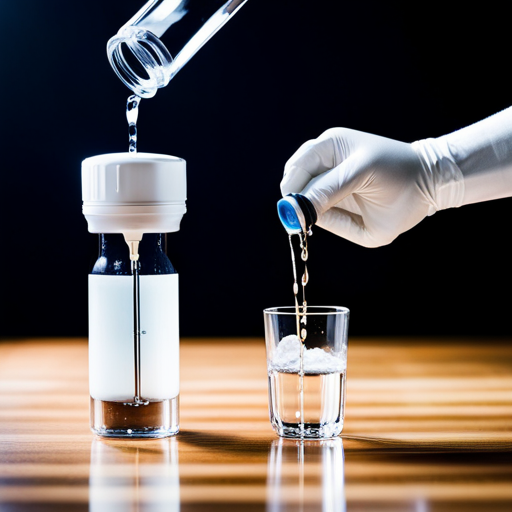Are you concerned about the presence of fluoride in your drinking water? While many public water supplies add fluoride for dental health benefits, some people worry about the potential risks, such as dental fluorosis. If you’re looking to remove fluoride from your water, there are several treatment methods available.
In this complete guide to fluoride water filters, we’ll explore the pros and cons of different types of filters, offer tips on how to choose the best filter for your needs, and provide a list of the best fluoride water filters on the market.
First, it’s important to understand what fluoride is and why it’s added to public water supplies in the first place. Fluoride is a mineral that has been shown to help prevent tooth decay. Many public water utilities add fluoride to their water supplies, usually at a concentration of up to 2 parts per million (ppm).
While the Centers for Disease Control and Prevention (CDC) maintains that water fluoridation is safe and effective, some people prefer to remove fluoride from their water due to concerns about potential health risks. If you’re one of those people, this guide will help you understand your options for removing fluoride from your drinking water.
Key Takeaways
– Fluoride is added to public water utilities at a rate of 2 ppm and can cause dental fluorosis.
– Reverse osmosis, water distillers, activated alumina, and ion exchange resin can effectively remove fluoride from drinking water.
– NSF and ANSI certification is important when choosing a fluoride water filter.
– Boiling water can actually increase fluoride concentration due to evaporation.
What is Fluoride?
You already know that fluoride is added to most public water supplies at a rate of 2 ppm, but what exactly is fluoride?
Fluoride is a naturally occurring mineral found in soil, water, and some foods. It’s commonly added to public water supplies as a way to prevent tooth decay. The benefits of fluoride in preventing tooth decay are well-established, and the Centers for Disease Control and Prevention (CDC) has deemed water fluoridation to be safe and effective.
However, there are potential health risks associated with fluoride exposure, particularly when consumed in large amounts. Dental fluorosis, a condition that causes white streaks or spots on teeth, can occur when children consume too much fluoride while their teeth are developing. In rare cases, excessive fluoride intake can lead to skeletal fluorosis, a condition that causes bone and joint pain, as well as weakened bones.
While water fluoridation is generally considered safe, it’s important to be aware of the potential risks and take steps to limit exposure if necessary.
Methods of Fluoride Removal
Explore different techniques to eliminate fluoride from your drinking water, such as reverse osmosis, distillation, activated alumina, and bone char activated carbon.
Reverse osmosis and water distillation are two of the most effective methods for removing fluoride from drinking water. Reverse osmosis filters work by using a semi-permeable membrane to remove impurities, including fluoride, from the water. These filters can remove up to 99% of fluoride from your drinking water. However, these filters can be more expensive and require more maintenance than other filtering methods.
Water distillation, on the other hand, involves boiling water and collecting the steam, which is then condensed back into liquid form. This method is highly effective at removing fluoride from water, but can be time-consuming and require a significant amount of energy.
Activated alumina is another option for fluoride removal, as it is a ceramic filter media that can remove 99%+ of fluoride. However, this method can be expensive and may require more maintenance than other types of filters.
It’s important to weigh the pros and cons of each method before choosing the right fluoride water filter for your needs.
Choosing the Right Filter
When selecting the right water filtration system, it’s important to consider factors such as size, cost, filter life, maintenance requirements, and installation.
Some filters may have a higher upfront cost, but a longer filter life and lower maintenance requirements, making them a more cost-effective option in the long run. On the other hand, some filters may have a lower upfront cost but require frequent filter changes, leading to higher overall costs over time.
When comparing costs, it’s important to not only consider the cost of the filter itself but also the cost of replacement filters and any necessary installation or maintenance fees.
Additionally, some filters may require more frequent maintenance, such as cleaning or replacing filter components, which can add to the overall cost over time.
Taking all of these factors into consideration can help you choose the right fluoride water filter that meets your needs and budget.
Conclusion
Congratulations! You’re now equipped with the knowledge to make an informed decision on how to remove fluoride from your drinking water.
As you learned, there are several methods available, including reverse osmosis, water distillation, activated alumina, and ion exchange resin. Each method has its pros and cons, so it’s important to consider your specific needs and budget when choosing the right filter for you.
Remember to research different brands and read reviews before making a purchase. The best fluoride water filters on the market include options from Aquagear, Berkey, and Home Master.
With the right filter, you can enjoy safe and clean drinking water without the worry of potential risks associated with fluoride. Cheers to a healthier you!
